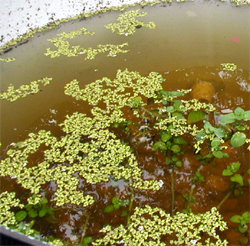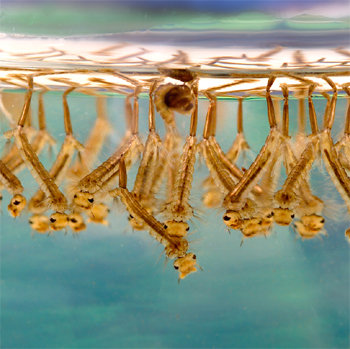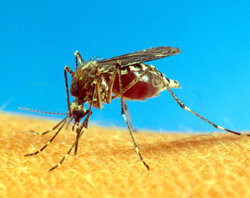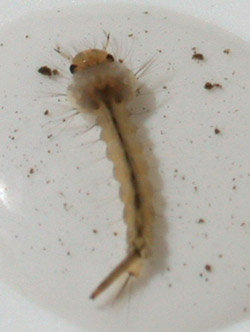





Drought Mitigation Plan
After a few consecutive summer droughts, I wanted to remedy the lack of water for my yard and garden, and save money on our county water bill. We built two rain water collection and storage barrel systems, and various small pond and fountain projects. We had a potential water capacity of nearly 600 gallons. I was so intent on collecting every raindrop possible, that I positioned empty buckets under each rain barrel overflow. I planned to use the bucket water first, probably in a day's time, before tapping into the precious water collection systems.

I had received some azolla (Azolla caroliniana), also known as Carolina Mosquito Fern (accompanied by duckweed), a floating water plant to cover the surface of the little ponds to prevent mosquito larvae growth, and to use as liquid fertilizer from the spent plants. All I needed was one good rain!
The rains finally came and stayed a few days. Every barrel and bucket was full to overflowing. The yard and garden were saturated, the weather was cool and overcast, and no watering was needed for a week or more. Most of the azolla died. I soon discovered mosquito larvae in everything, including the inside of the rain barrel systems, because we had forgotten to place screens in the overflows as planned! Thus started our summer-long battle with the menacing bloodsucking skeeters.
 We quickly corrected our overflow screen blunder, and sealed the entire water system to prevent mosquitoes from entering, or leaving. What was left of the azolla could not grow quickly enough to cover the ponds at this point. I needed fish in the small ponds to eat the mosquito larvae before the adults emerged from the water! Our local pet store took two weeks to furnish healthy goldfish (they had been sick). By the time the fish were in place, it was too late. We had no idea the life cycle of a mosquito was so fast!
We quickly corrected our overflow screen blunder, and sealed the entire water system to prevent mosquitoes from entering, or leaving. What was left of the azolla could not grow quickly enough to cover the ponds at this point. I needed fish in the small ponds to eat the mosquito larvae before the adults emerged from the water! Our local pet store took two weeks to furnish healthy goldfish (they had been sick). By the time the fish were in place, it was too late. We had no idea the life cycle of a mosquito was so fast!
We added aeration stones in the ponds for the goldfish, and learned the turbulence created by the bubbles would have been all that was needed to prevent mosquito egg deposits, and to kill existing larvae. We planted lemon balm, catnip, and anise hyssop around our patio to discourage aerial attacks during cookouts. We inverted any potential water-holding yard items, like the wheelbarrow, pots, and the overflow buckets. We placed clay pot houses in shady nooks, and feeders of seed to encourage toad and bird participation in our mosquito mitigation effort.
We are still getting eaten alive by mosquitoes during the early morning and evening hours, but with the cooler fall weather, we thought our mosquito mess would soon be over. After searching the Internet to prepare for next year, I learned that mosquitoes hibernate, or have a built-in antifreeze system, and the eggs can survive up to five years before hatching. Our bug battle was not over. They would be waiting for us in just a few months, starved for blood!
With mosquitoes spreading viruses and diseases like West Nile, yellow fever, dengue, malaria, encephalitis, and heart worm and equine encephalitis (in our pets), communities have spent much money on research to devise methods to mitigate mosquito populations in their towns. The more we know, the better we can protect ourselves, and reduce the numbers of bloodsuckers in future growing seasons!
Species: Mosquito means "little fly" in Spanish; they are in the Culicidae family of insects; 2,700 different species known, with 50 not responding to insecticides; the species has survived since the Jurrasic Period.[1] 
Aedes aegypti biting human.jpg. Public Domain
Mosquito_larva.jpg. Public Domain Habitat: They need still waters for three, out of the four, stages of their life cycle. Food: They need nectar from flowers to live, only the females need protein (blood meal) to form eggs. Larvae eat microorganisims in the water. What
attracts
them: From 100 feet away, mosquitoes can sense movement; warmth, they use infrared; and can sense chemicals from sweat, and the carbon dioxide from our breath. They are attracted to dark colors, fair-haired/skinned people (prefer ovulating women), and they are more active during a full moon.[2] Traits: Females are larger than males, make the high-pitched buzzing noise to attract males, and are the ones that bite to suck blood. They can travel 40 miles to feed, at speeds of 1-1/2 mph, and up to 40 feet in the air.[2] They are active until first frost in cooler climate zones. Life
cycle: Female lay eggs in stagnant quiet (still) water–Larvae hatch from the eggs (wigglers)–Develop into pupa (tumblers)–Adult mosquitoes emerge from the pupa.
Males live only a few days after mating. Females can live a few weeks or through the winter by hibernating in moist leaves and in the ground (their bodies carry a substance like antifreeze).
The complete life cycle of a mosquito, from egg to adult, can be as little as two weeks![3]
National Geographic: The Mosquito (www.youtube.com/watch?v=sjV0JpIAH78)
I learned the hard way how quickly a mosquito infestation can start, and that the methods to mitigate the damage may take more than a season to correct. If you are doing all that you can do to keep mosquitoes at bay on your property, but still have a problem, you might enlist the help of neighbors to see if more can be done to control their population and reproduction in your neighborhood.
Please refer to the sidebar for additional information on plants, predators, and methods to deter the menacing mosquitoes in your yard, and other Dave's Garden articles in the green box below.
Endnotes:
[1] "Mosquito Bytes". Whyfiles.org. 22 Aug 2002. http://whyfiles.org/016skeeter/. 06 Oct 2008.
[2] HubPages: Mosquito FAQ. http://hubpages.com/hub/Mosquito-Facts. 06 Oct 2008.
[3] Rutgers University. New Jersey Mosquito Control Association, Inc (NJMCA). http://www-rci.rutgers.edu/~insects/mosfaq.htm. 06 Oct 2008.
[4] "Bats Eat Mosquitoes . . .". Hendry Co Horticultural News. University of Florida, Cooperative Ext. Serv. http://hendry.ifas.ufl.edu/HCHortNews_Bats.htm. 06 Oct 2008.
[5] "Mosquito Hawks". Amosquito.com. http://www.a-mosquito.com/mosquito-hawk.php. 08 Oct 2008.
[6] Anne Bond. "Safe Mosquito Control". 14 May 1999. Care2.com. http://www.care2.com/greenliving/safe-mosquito-control.html. 08 Oct 2008.
[7] Genetics and Molecular Biology. 2003. SciELO Brasil. http://www.scielo.br/scielo.php?script=sci_arttext&pid=S1415-47572003000400004&lng=pt&nrm=iso. 08 Oct 2008.
Prevention:
Article Photo Credits:
Wiki Commons: "Culex sp larvae.png". PLoS. Creative Commons Attribute 2.5
Public Domain images as cited.
All other photos belong to the author.
Related Info At Dave's Gardens!
Articles: Predator Insects, Azolla, Summer Bites, Bug Poisons from a Veterinary Perspective
DG BugFiles: Database, Mosquito search list
(Editor's Note: This article originally ran October 10, 2008.Your comments are welcome, but please be aware that authors of previously published articles may not be able to respond to your questions.)
Copyright © www.100flowers.win Botanic Garden All Rights Reserved